Assembly Republicans push crime bills
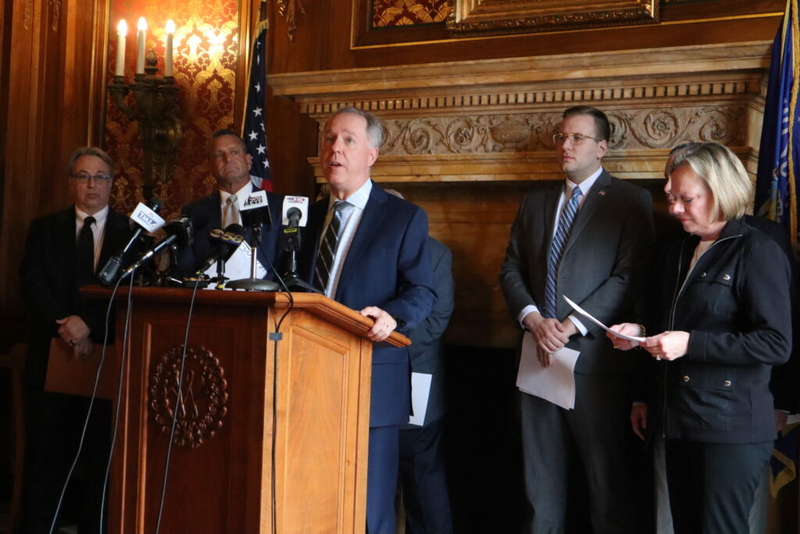
The Assembly took up a package of law enforcement-focused bills during its floor session Wednesday. The bills covered a range of issues including parole, cash bail, reckless driving penalties, firearm possession by felons and creating a new state-level riot law. Introduced by Republican legislators, the bills continue a tough-on-crime push by the GOP.
At the start of the floor session, after the opening prayer and the pledge of allegiance, the Assembly honored several hometown heroes from Milwaukee, Sheboygan and other communities. All of the honored hometown heroes were law enforcement officers.
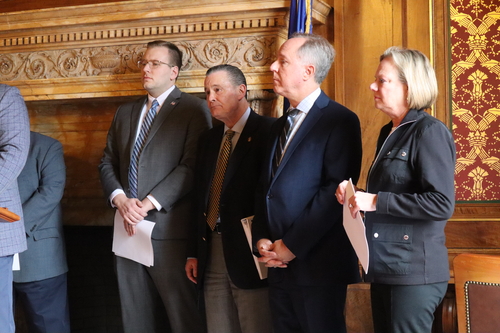
Two of the bills, introduced by Rep. Bob Donovan (R- Greenfield), focus on reckless driving. Donovan explained during a press briefing that Assembly Bill 55 essentially doubles existing reckless driving penalties. Forfeiture fines would increase from a range of $25 to -$200 to between $50 and -$400. A second reckless driving offense would bring fines upwards of $1,000, and if bodily harm is caused, then fines could go up to $4,000. Reckless drivers could be imprisoned for no less than 60 days in the county jail, double the penalty under current law.
Ahead of the floor session, Rep. Greta Neubauer (D-Racine) blasted the new set of bills. “We are three months into the legislative session and Republican legislators have yet to come to the table with plans for how to address the real causes of violent crime, provide adequate funding to our communities for critical services, and respond to the pressing issues Wisconsinites face,” said Neubauer in a statement. “Unfortunately, today is set to be more of the same.”
Neubauer added, “Wisconsinites deserve action from the Legislature on the challenges they face in their everyday lives. They deserve to feel safe in their communities and to live free from the threat of violence. Instead of focusing on proactive policy that would actually address these challenges, legislative Republicans continue to prioritize reactive legislation.”
What is the right solution for crime concerns?
“This is common sense legislation,” said Donovan, a statement repeated by other GOP lawmakers Wednesday as they discussed other crime bills. Donovan noted that the last time reckless driving laws were adjusted in Wisconsin was in 1953. “We need 2023 penalties to deal with 2023 problems.” After Donovan spoke, members of the Assembly broke into loud applause, which is not generally allowed on the Assembly floor.
Donovan’s other bill, Assembly Bill 56, would allow a political subdivision to tow and impound vehicles used in reckless driving incidents. Last May, the Milwaukee Police Department (MPD) began a new policy of towing cars involved in reckless driving incidents, which raised a question about whether Donovan’s bill is redundant. Nevertheless, Gov. Tony Evers is expected to sign the bills if they pass the Assembly and Senate. The bill passed 30-1 in the Senate, while the other reckless driving bill hasn’t been taken up in the Senate.
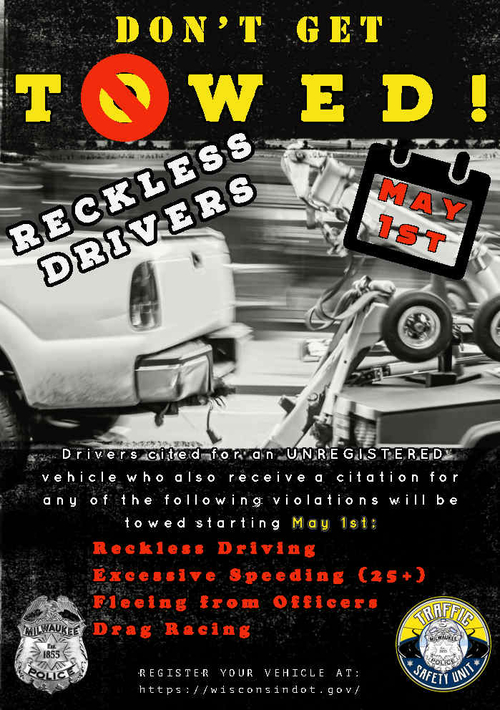
Assembly Speaker Robin Vos said he wasn’t surprised that Evers is expected to sign the reckless driving bills. “It’s actually not a surprise that we are close to an election, where they have put all their chips on someone who is weak on crime, and wants to let dangerous people out of jail,” said Vos, referring to a crime-focused ad campaign conservative groups and Republicans have launched against Wisconsin Supreme Court candidate Janet Protasiewicz. “So I am glad he is going to sign our bills, they are the right public policy.”
Another bill, AB-47, authored by Rep. John Spiros, focuses on the parole commission. During the November election, parole and bail both became hot-button issues. Cash bail affects pretrial detention for people who haven’t been convicted of a crime. Parole concerns individuals who were sentenced prior to the year 2000, before the current “truth in sentencing” policy eliminated the opportunity for early release. People who are still in the parole system have been incarcerated at least two decades, and often longer. Debates over parole last year focused on issues of transparency, such as notifying a victim’s family when someone is granted parole.
Spiros’ bill changes open meetings law to require parole decisions to be posted on the Department of Corrections (DOC) website. Exceptions for probation, extended supervision or parole under open meetings laws are also eliminated. Other actions by the parole commission would also be required to be posted on the DOC website, such as when paroles are granted or denied. The bill passed the Assembly to a vote of 70-20, drawing bipartisan votes.
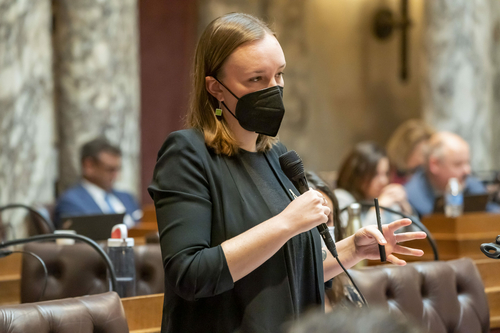
A bill authored by Rep. Cindi Duchow (R- Delafield), AB-54, deals with bail and pretrial release. In April, voters will consider Republican-sponsored amendments to the Wisconsin Constitution that give judges latitude to keep people in jail awaiting trial beyond the current standard (whether they pose a threat of “serious bodily harm”) and to consider conditions other than ensuring a defendant’s appearance at trial — the current standard — when setting bail. Duchow’s bill is a companion to the constitutional amendment drive and redefines the types of harm to the community judges should consider when deciding on pretrial release and setting bail. The bill defines “serious harm” as pain or injury, including mental anguish, physical impairment or emotional harm, property damage or financial losses of over $2,500. It also sets new definitions for “violent crime.”
Republican proponents of the bill and the constitutional amendments claim that the amendment would give judges the ability to consider past criminal convictions and other factors, in setting bail. Critics push back that judges already have wide latitude in setting conditions of release or denying bail outright. Duchow asserted during the Assembly floor session that “this is what people in our state want.” Formerly incarcerated people whose right to vote has not yet been restored will be unable to cast a ballot in April on the policy. The bill’s counterpart in the Senate passed 20-11, along party lines.
AB-57, which requires prosecutors to request court permission before dismissing or amending charges also came to the floor. The bill covers domestic abuse violations, car theft, sexual assault, crimes against children, illegal firearm possession and reckless driving. The bill, written by Rep. Nik Rettinger (R- Mukwonago), overlaps with other legislation discussed in the Assembly on Wednesday. These include AB-58, a bill authored by Rep. Tom Michalski (R-Elm Grove), which sets a five-year minimum sentence for felons found in possession of a firearm. Spiros also, for a third time, introduced AB-70, a bill he says would define what a “riot” is in the state of Wisconsin.
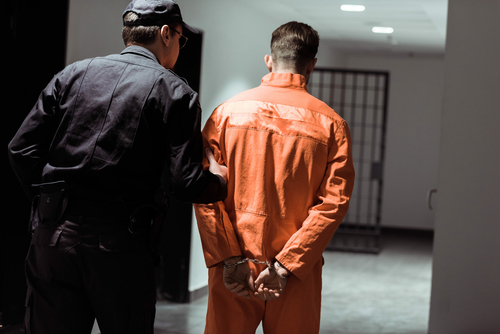
Under the bill, a gathering of at least three people “that constitutes a clear and present danger of property damage or personal injury or a threat of an act of violence,” qualifies as a riot. The bill has been criticized as an attempt to criminalize protests, especially those which sprang up after the murder of George Floyd by Minneapolis police officers in 2020. Debate over the bill, which passed the Assembly in a 62-35 vote. Whereas Republicans framed 2020 as a year of rioting and property destruction, Democrats pushed back that the riot bill is too broad and would chill First Amendment activity including protests.
Rep. John Macco (R-Ledgeview) also introduced a bill to allow Deferred Action for Childhood Arrivals (DACA) recipients to apply for employment at local law enforcement agencies. “This is not an immigration bill,” Macco said, and touted the legislation as a remedy for recruiting challenges for police agencies.
Today is all about the Republicans’ year of crime and punishment.
Rep. Ryan Clancy (D-Milwaukee), Rep. Dora Drake (D-Milwaukee), and other Democrats argued that several of the bills would worsen Wisconsin’s problem with mass incarceration. The state has among the highest rates of incarceration of Black residents in the country.
Democratic representatives also pushed back against the mandatory minimum for firearm possessions, questioning why background checks aren’t being expanded and why the state’s loophole for private gun sales has yet to be closed.
Moore Omokunde argued for mental health and road redesign funding, which could help address reckless driving. Instead, Moore Omokunde said in a floor speech, “Today is all about the Republicans’ year of crime and punishment.” He added that the bills seek to ramp up punishment, “rather than attempting to address the root causes of why people act the way that they do, particularly over the last three years.”

“It goes without saying that those penalties will fall hardest on disadvantaged communities throughout Wisconsin,” he said. Moore Omokunde added that he has regularly experienced being harassed by pick-up trucks on I-94 going excessive speeds. As he spoke, some Republican legislators chuckled. Moore Omokunde asked supporters of the reckless driving bills to also work on policies of criminal justice equity around the issue of reckless driving.
Milwaukee is not the hell hole that you want to make it out to be.
Republican lawmakers repeatedly referenced Milwaukee as they discussed reckless driving and crime. Duchow said she was thinking twice about going to Milwaukee for recreational events. Others described Milwaukee as a hotbed of violent crime.
Sinicki said she planned to vote for one of the reckless driving bills, which passed the Assembly .Yet, she added, she objected to the fear-mongering about Milwaukee. “All you’re talking about is Milwaukee,” Sinicki said. “I was born in Milwaukee, I now live in Milwaukee, and I will die in Milwaukee. I drive those streets every single day. Milwaukee’s not the hell hole that you want to make it out to be.”
“If you want to sit here, day after day, and criticize Milwaukee, try living here,” she said. “Maybe, you’ll have the right to say something about it.”








